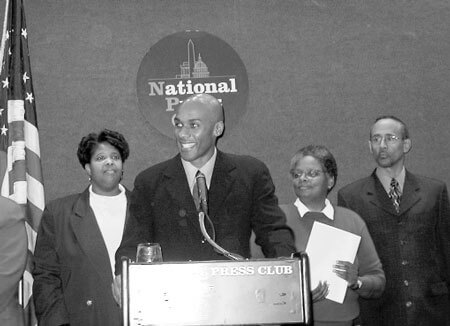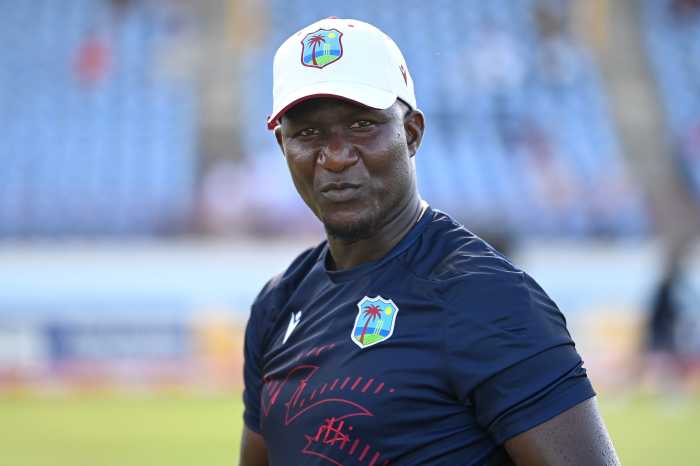Gay and lesbian activists gather to reach out to African Americans
Capital Summit
Donna Payne, Keith Boykin, Mandy Carter, and Alvin Williams.
The National Black Justice Coalition announced a nationwide campaign to generate support for same-sex marriage among African Americans. It came at a news conference at the National Press Club in Washington, DC on December 8.
The coalition is an ad hoc group formed only five days earlier, with Keith Boykin as one of its co-chairs. Boykin, an author and former White House staff member, served as executive director of the now defunct National Black Lesbian and Gay Leadership Forum.
The purpose is “to counter right wing misinformation about blacks and marriage equality,” said Boykin. “Our first goal is to educate and inform our community about marriage equality. Our second goal is to defeat the recently proposed constitutional amendment that would discriminate against gay and unmarried couples.”
Boykin announced that Coretta Scott King has joined a list of African American supporters of marriage equality that includes Rep. John Lewis, Democratic presidential candidates Rev. Al Sharpton and former Ambassador Carol Moseley Braun, Whoopi Goldberg, San Francisco Mayor Willie Brown, and former U.S. Surgeon General Joycelyn Elders.
“Marriage is not a wedge issue for African Americans,” Boykin declared.
And while he acknowledged that the community is more conservative on issues of marriage than on civil rights, “[We] do not vote based on gay issues. We vote on jobs, the economy, health care, war and peace, and social justice.”
“The Federal Marriage Amendment [FMA] would mark the first time in that nation’s history that we would be amending the Constitution to specifically discriminate against a single group of Americans,” said Donna Payne, a field organizer for the Human Rights Campaign (HRC). “This is not about special rights, it’s about protecting our families.”
“I strongly oppose this amendment, in love,” said Rev. Michaele Moore, pastor of God’s Living Spirit Church, a DC-area congregation. “It is biased and unloving in the strongest sense of the word.” She quoted from First Corinthians that people should love unconditionally.
“Today we are asking for marriage equality, not ‘gay marriage.’ That’s the shorthand term that our opponents use to make gay people’s families seem different or lesser,” explained Mandy Carter, a long-time community organizer now working in North Carolina. “The truth is that we are working for an end to discrimination in marriage itself… Same-sex couples want the equal choice—the freedom to marry—not two lines at the clerk’s office for separate and unequal treatment.”
Maurice Franklin applauded the Leadership Conference on Civil Rights, the grand coalition behind all national civil rights legislation for which he formerly worked, for issuing a statement opposing the FMA. He called upon the nation’s major black and civil rights organizations to “stand up now” against the amendment, and to support marriage equality.
Invoking the name of Bayard Rustin, the black gay organizer of the 1963 March on Washington, Franklin said, “For decades, black gays and lesbians sat at the table silently and patiently while everyone else got their piece of the American dream. Now we will sit no longer and be silent!”
“We certainly are going to have to put pressure on the black civil rights community” to advocate the position of marriage equality, Franklin added.
Earlier this year, Richard Goldstein at the Village Voice reported that the group pushing the FMA had designated Rev. Walter Fauntroy, an African American who served ten terms as the District of Columbia’s non-voting delegate to the U.S. House, as its “public face.”
A reporter noted that some find comparisons of the black and gay civil rights movements to be distasteful.
Boykin called it “shortsighted to begin to think that we can oppress others.”
“I’m just as black as I am gay,” said Franklin, “I couldn’t, I wouldn’t choose between them.”
“I cannot divide myself,” added Payne. She explained how when she and her partner go to rent an apartment and they say, “We don’t rent to your kind,” the effect is the same regardless of whether they are discriminating against her because of the color of her skin or the sex of her partner.
Dr. Alvin Williams and Nigel Simon, a Washington couple, have adopted a son “and are treated as a family by our own extended family, friends, and coworkers.” Simon said. “Marriage discrimination could deprive our family of veteran’s benefits, civilian benefits, tax benefits, and immigration benefits. That could expose our son to enormous instability if something should happen to one of us.”
“This is a real issue about our lives. Our burdens are heavier and our expenses are greater simply because we can’t get legally married,” said Saundra Toby-Heath. She and her partner Alicia Heath-Toby are among the plaintiffs suing the state of New Jersey for the right to marry.
“We pay first-class taxes, but we’re treated like second-class citizens,” she said. “If two complete strangers met each other last week and got legally married today, they would have more rights under the law than our relationship has after 15 years of being together. That’s not fair and that’s why we’re here today.”
For Alicia Heath-Toby, homophobia is at the root of stigma and discrimination that “resonates and festers on our self-esteem” and leads to too many African Americans engaging in activities that put them at risk for HIV.
Moore said that one of her teenage psychotherapy clients had attempted suicide the day before.
“There is self-hate and internal homophobia,” she said. “There aren’t enough role models in the GLBT community of African Americans who are successful, educated, active, and people of faith standing up and saying, this is who I am, and I’m okay.”
The coalition intends to raise and spend $100,000 on targeted advertising in black newspapers, magazines, and radio stations, primarily through individual contributions. When asked later if HRC will contribute to the effort, Payne said she was sure that it would, but said that a dollar amount had not yet been discussed.


































